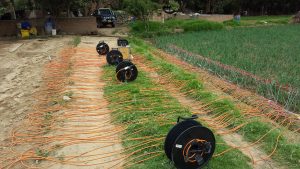Andres is having his doctoral dissertation: “A multidisciplinary approach: geophysics, hydrochemistry and hydrometeorology for addressing water security in alluvial fans”. Tuesday, October 23, 2018.
Click here for the dissertation’s invitation and link for the thesis.

Abstract
Water security offers to the local population an adequate quality and quantity of water for health, economy, livelihoods and ecosystems. Hence, achieving basic levels of water security should be a priority in areas where access to fresh water is scarce. The Punata alluvial fan (Bolivia) is a semiarid zone and an important agricultural zone, where the main source of water is groundwater. Therefore, it is important to retrieve and broaden the knowledge about the main hydrogeological mechanisms, and the physical and chemical properties of the groundwater in the Punata fan. This research aims to apply and combine different disciplines such as hydrometeorology, geophysics and hydrochemistry to retrieve important hydrogeological information in the Punata fan. This information is of particular interest for achieving water security, so that freshwater (i.e. groundwater) can be provided to the local population, industry and environment.
The hydrometeorological results suggests that there is a cycling of El Niño events which are related to regional drought periods, hence the recharge of groundwater can be affected. Records from wells suggest that there is a lowering of the water table, which is more evident when an El Niño event take place in the same or in the previous years. Therefore stakeholders should take into consideration the occurrence of El Niño events in order to plan a more efficient usage of water. The geophysical results and interpretation are important for proposing and refining hydrogeological conceptual models, where a more accurate description of the layering, depth and thicknesses of the different aquifers units are displayed. One main finding is the delimitation of a saline layer at the bottom of the aquifer system. The delimitation of this saline layer is important in order to prevent the pollution of fresh water when drilling and pumping take place. Another application of the geophysical results is for elaboration of groundwater vulnerability maps, which are important for preventing groundwater contamination. The hydrochemical results highlight that groundwater in the Punata fan is mainly recharged by the Pucara River, while recharge from precipitation and irrigation are of less importance. The analysis of groundwater salinization suggests that saline deposits lying in the lacustrine layer are the main cause of salinization, which is also supported with the geophysical results where a saline layer was detected.
A multidisciplinary approach can produce more complete, accurate and reliable hydrogeological information in alluvial fans, where groundwater is the main source of water supply. The results and findings of this research are important for the local actors, due to the fact that a better understanding of the major hydrogeological processes is provided. Therefore, with this knowledge, further plans for sustainable groundwater management and protection can be proposed. Thereafter, if access to fresh water (i.e. groundwater) is guaranteed in the study area, basic levels of water security can be reached and with this an improvement of the local wellness.
